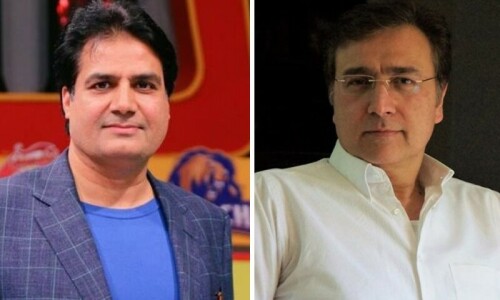A special court in Islamabad on Thursday granted bail to journalist Khalid Jamil who was arrested last week on charges of spreading “provocative narrative” against state institutions through social media posts.
Special Judge Central Shahrukh Arjumand approved the journalist’s bail plea against surety bonds worth Rs50,000. The journalist was subsequently released from Adiala Jail after the court issued his bail orders.
The initial information report filed by the FIA against the journalist stated that Hussain was “found sharing and propagating highly intimidating content/tweets on social media/Twitter” (now X).
“The accused had knowingly misinterpreted and disseminated anti-state narrative by sharing false misleading and baseless information which are also likely to cause fear in the public and may incite anyone to commit an offence against the state or the state institution or public tranquility,” it had said.
The FIA had added that the “accused persons including Muhammad Khalid Jamil propagated, promoted and glorified anti-state, provocative and hatred narrative against the state institutions.”
The agency had said such intimidating content of blaming and naming through social media accounts, is a mischievous act of subversion to create a rift between the general public and state institutions to “harm the state of Pakistan”.
It went on to say that through such intimidating content including videos, the accused “attempted to provoke the general public against the state institutions including the judiciary, by trying to create a feeling of ill-will among pillars of the state”.
Earlier this week, Jamil’s lawyer filed a post-arrest bail plea. At the previous hearing, the court had asked FIA to submit the record related to the journalist’s tweets.
The hearing
At the outset of the hearing today, Jamil’s lawyer Naveed Malik told the court that allegations against Jamil were baseless.
He emphasised, “Khalid Jamil is a prominent figure in the media landscape and presently holds the position of Bureau Chief at a highly respected news organisation.”
He further underscored that Article 19 of the Constitution unequivocally upholds the right to freedom of expression.
The lawyer argued that the journalist had been detained under Section 20 of the Prevention of Electronic Crimes Act (Peca), pointing out that the particular section of the law had been declared unconstitutional by the Islamabad High Court. Consequently, any actions taken under it were deemed null and void, he claimed.
Section 20 of Peca states: “Whoever intentionally and publicly exhibits or displays or transmits any information through any information system, which he knows to be false, and intimidates or harms the reputation or privacy of a natural person, shall be punished with imprisonment for a term which may extend to two years or with fine which may extend to one million rupees or with both.”
Malik pointed out that the FIA had filed the FIR in defiance of court orders.
Furthermore, he elaborated on how the law enforcement personnel had infringed upon the petitioner’s privacy during the arrest.
In response, the prosecutor argued that a specific narrative appeared to be taking shape based on Jamal’s tweets. He emphasised that while trends on X might be transient, they often led to institutions being targeted, potentially compromising “national identity”.
Drawing a parallel, he cited the case of Azam Swati, where the senator had allegedly posted a tweet targeting the former army chief, illustrating that such incidents were not isolated.
Upon hearing these arguments, the court reserved its verdict.














































Dear visitor, the comments section is undergoing an overhaul and will return soon.